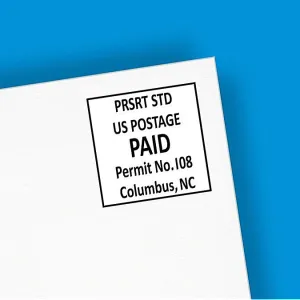Direct Mail Marketing: 8 Benefits of Variable Data Printing

estimated reading time: 4 minutes
Direct Mail is a proven and effective form of targeted
marketing. Unlike email marketing messages that arrive as pixels on a screen,
direct mail arrives in the form of professionally-printed postcards, sales
letters, or promotional literature.
Delivered by the U.S. Postal Service to homes and businesses,
direct mail pieces are physical documents that can be held in one's hands and easily
interacted with. When compared to emailed communication, direct mail provides a
much more engaging experience for the recipient.
What is Variable Data Printing?
Variable Data Printing, also known as VDP, is a digital
printing technique that enhances direct mail campaigns through the use of creative
personalization. The VDP process starts with a fixed general layout or common template.
Database software then feeds the printing press with segments of information
that are unique to each recipient.
These bits of information are applied to various places within
the layout, allowing every piece processed within the press run to be printed
with different text and/or graphic elements. Since digital printing does not
use printing plates, there is no stopping or slowing down of the press. The
different messages print one after the other in a single press run with no
hesitation.
Instead of sending the exact same message to everyone on a
mailing list, variable data printing allows each printed piece to be tailored
to the distinct interests and experiences of the intended recipient. Headings,
subheadings, body copy, images, offers, and calls to action are all examples of
design elements that can be easily modified to match the client or prospect
being targeted.
Hence, the marketing message becomes more relevant and
meaningful. In turn, this draws attention and heightens interest, increasing
the probability that the marketing message will be read and acted upon.

Below are 8 Benefits of Variable Data Printing…
1. Best of Both Worlds - VDP combines the cost benefit of a
mass mailing with the effectiveness of one-on-one communication. The efficiency
gained by printing and processing the direct mail pieces in bulk translates to a
reduction in production costs. At the same time, the customization of each printed
piece boosts its appeal to every recipient as an individual, thereby
increasing the opportunity for developing a positive interaction.
2. Targeted Personalization - a marketing message that is targeted
toward a client's unique preferences and lifestyle offers much more appeal than
a generic message. Variable data printing can be used to target many different factors,
including age, gender, income level, buying habits, pastimes, hobbies, pets,
vehicles owned, or any other trait or characteristic that helps define
prospective clients on a personal level.
3. Flexibility - Variable data printing will enhance the marketing
efforts of virtually any company, regardless of size or industry. VDP also works
well for many different formats of direct mail. Even though most people associate
VDP with promotional postcards, it is also a popular choice for sales letters,
folded mailers, thank you cards, newsletters, coupons, flyers, catalogs, and
brochures.
4. Short Production Runs - Because VDP projects are printed
on digital presses, a long production run is not a requirement. In fact, shorter
production runs are what digital presses have been designed to produce. Also,
the turnaround time is faster because digital presses do not require the making
of printing plates or an extensive set-up process.
5. Economical Test Marketing - Since VDP projects can be produced in
shorter runs, this provides a very economical way to conduct A/B testing. Using
small test groups, different designs, messages, sizes, CTA's, etc. can be market
tested to see which options yield a better response. This provides useful
insight before committing resources to a larger mailing campaign.
6. Company Info can also be Variable - up to now, we have
discussed using VDP to entice clients and prospects using data specific to
them. However, VDP can also be used to print variable information about the
company issuing the mailing. For example, rather than just printing the phone
number and address of the corporate office on every piece, a company could use
VDP to add the contact information for different stores or salespeople that service
the geographic regions where the mail pieces are actually being sent.
7. Tracking Capabilities - VDP provides an excellent way to track the
effectiveness of a mailing. By printing unique identifiers on direct mail
pieces - such as offer codes, coupon codes, QR codes, personalized URLs (pURLS)
and similar actionable items - it is easy to determine which recipients took action,
what actions they took, and when they took the action.
8. Increased Response Rates - VDP uses personalization techniques which help increase
the response rate of a mail piece. The response could be an inquiry, a quote
request, a visit to a website, a trip to a brick-and-mortar store, or an actual
purchase. Of course, all of these steps lead to the ultimate goal of achieving
a strong return on investment while building lasting client relationships.
Would you like to learn more about Variable Data Printing?
Get in touch with Color Vision to discuss your next direct
mail project. We are a full-service print facility that offers variable data
printing services as well as mail fulfillment.
Give us a call at 800-543-6299 when you're ready to discuss
your printing and mailing needs. Or, if
you already know your specifications and would like a quote, please use our simple Quote Request form.
We truly hope you will consider us for your next
printing and mailing project. As always, we look forward to working with you!
Related Articles

Direct Mail Marketing Campaigns: 3 Different Approaches
Read This Article

Direct Mail Marketing: What are Postal Indicia?
Read This Article

US Postal Service EDDM: Is it a Good Fit for Your Business?
Read This Article

Direct Mail Marketing: 8 Benefits of Variable Data Printing
Read This Article